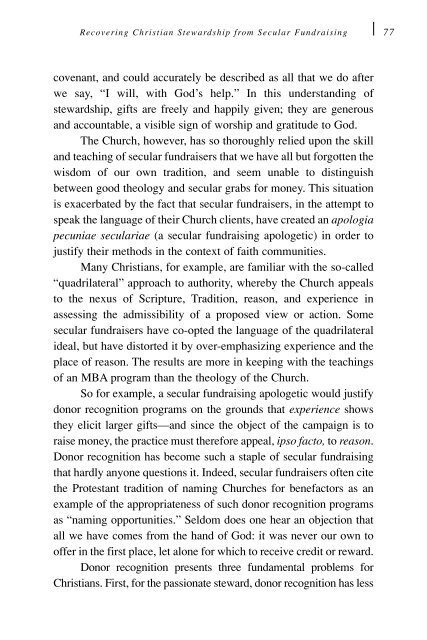Passionate Steward - 10th Anniversary Edition
10th Anniversary Edition of The Passionate Steward - Recovering Christian Stewardship from Secular Fundraising (St. Brigid Press - 2002).
10th Anniversary Edition of The Passionate Steward - Recovering Christian Stewardship from Secular Fundraising (St. Brigid Press - 2002).
You also want an ePaper? Increase the reach of your titles
YUMPU automatically turns print PDFs into web optimized ePapers that Google loves.
Recovering Christian <strong>Steward</strong>ship from Secular Fundraising 77<br />
covenant, and could accurately be described as all that we do after<br />
we say, “I will, with God’s help.” In this understanding of<br />
stewardship, gifts are freely and happily given; they are generous<br />
and accountable, a visible sign of worship and gratitude to God.<br />
The Church, however, has so thoroughly relied upon the skill<br />
and teaching of secular fundraisers that we have all but forgotten the<br />
wisdom of our own tradition, and seem unable to distinguish<br />
between good theology and secular grabs for money. This situation<br />
is exacerbated by the fact that secular fundraisers, in the attempt to<br />
speak the language of their Church clients, have created an apologia<br />
pecuniae seculariae (a secular fundraising apologetic) in order to<br />
justify their methods in the context of faith communities.<br />
Many Christians, for example, are familiar with the so-called<br />
“quadrilateral” approach to authority, whereby the Church appeals<br />
to the nexus of Scripture, Tradition, reason, and experience in<br />
assessing the admissibility of a proposed view or action. Some<br />
secular fundraisers have co-opted the language of the quadrilateral<br />
ideal, but have distorted it by over-emphasizing experience and the<br />
place of reason. The results are more in keeping with the teachings<br />
of an MBA program than the theology of the Church.<br />
So for example, a secular fundraising apologetic would justify<br />
donor recognition programs on the grounds that experience shows<br />
they elicit larger gifts—and since the object of the campaign is to<br />
raise money, the practice must therefore appeal, ipso facto, to reason.<br />
Donor recognition has become such a staple of secular fundraising<br />
that hardly anyone questions it. Indeed, secular fundraisers often cite<br />
the Protestant tradition of naming Churches for benefactors as an<br />
example of the appropriateness of such donor recognition programs<br />
as “naming opportunities.” Seldom does one hear an objection that<br />
all we have comes from the hand of God: it was never our own to<br />
offer in the first place, let alone for which to receive credit or reward.<br />
Donor recognition presents three fundamental problems for<br />
Christians. First, for the passionate steward, donor recognition has less




